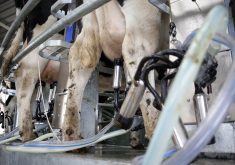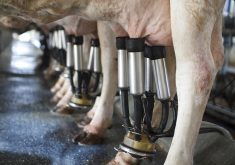Critics said a meeting between government and grocery executives Sept. 18 was unlikely to result in lower food prices for Canadian consumers.
Prime minister Justin Trudeau called the retail leaders to Ottawa, asking for a plan to combat food inflation and suggested taxes could be imposed if price hikes weren’t dealt with.
Speaking Sept. 14, Trudeau said the government would take steps to deal with escalating food prices. He said food prices should be “stabilized in the near term.”
Grocer profits are rising along with those consumer costs, he said, and families are struggling to put food on their tables.
Read Also

Using artificial intelligence in agriculture starts with the right data
Good data is critical as the agriculture sector increasingly adopts new AI technology to drive efficiency, sustainability and trust across all levels of the value chain.
“We are also looking at all tools at our disposal and we are not ruling out the use of tax measures in order to restore the grocery price stability that Canadians expect,” said a news release.
The government intends to take immediate steps to enhance competition in the grocery sector and legislative amendments to the Competition Act will be introduced. Parliament resumed sitting Sept. 18 after its summer break.
Those measures include giving the Competition Bureau more power to compel information for effective and complete market studies, removing the efficiencies defence, which allows anti-competitive mergers in some situations, and empowering the bureau to act against collaborations that stifle competition and consumer choice.
Innovation, science and industry minister Francois-Philippe Champagne said these are concrete actions and the industry has to step up, too.
“Our government will continue to work day-in and day-out to bring relief to consumers and increase competition,” he said.
Grocery prices rose 8.5 percent year-over-year in July, which is higher than the overall inflation rate.
Retail Council of Canada said Canadians are struggling with the cost of living but grocers are doing what they can to push back on suppliers and stabilize food prices.
“Anyone who understands the grocery sector knows why food prices have gone up,” said the council, noting that grocery prices and profits have nothing to do with it.
“Simply put, the price on grocery shelves is driven by increased vendor costs from food manufacturers and producers, itself caused by a host of global factors, including supply chain challenges, the war in Ukraine, fuel prices and climate events.”
The council said the federal government should look in the mirror when it casts blame.
“The government could take a number of steps to make food more affordable, including temporarily removing the carbon tax from farmers, food processors and distributors and cancelling government’s planned plastic packaging targets that could increase costs to grocers by $6 billion a year,” it said.
Food economist Michael von Massow, from the University of Guelph, said the meeting with grocers is unlikely to convince the public that the government is taking strong measures.
“It appears to be something to take heat off of them, rather than something that will really fundamentally affect affordability for Canadians,” he told media outlets, adding that the executives are an “easy target.”
The executives appeared before the Commons agriculture committee earlier this year when that committee was studying food inflation.
At that time, von Massow said it was “disingenuous” for the government to let consumers think it could bring grocers in line and solve the problem.
Sylvain Charlebois, head of the Agri-Food Analytics Lab at Dalhousie University, was scheduled to be an unpaid observer at the Sept. 18 meeting with the executives, finance minister Chrystia Freeland and Champagne.
















